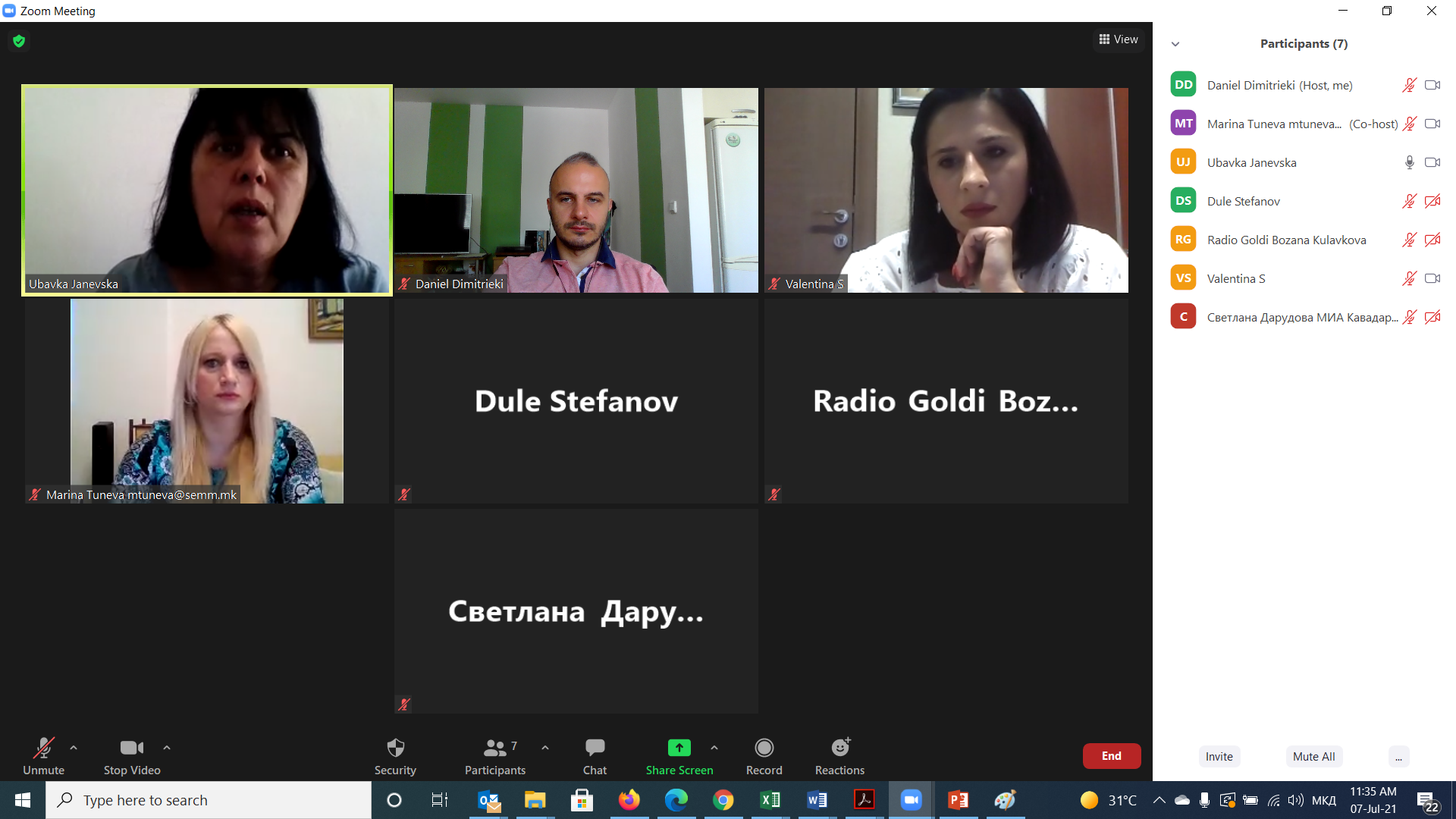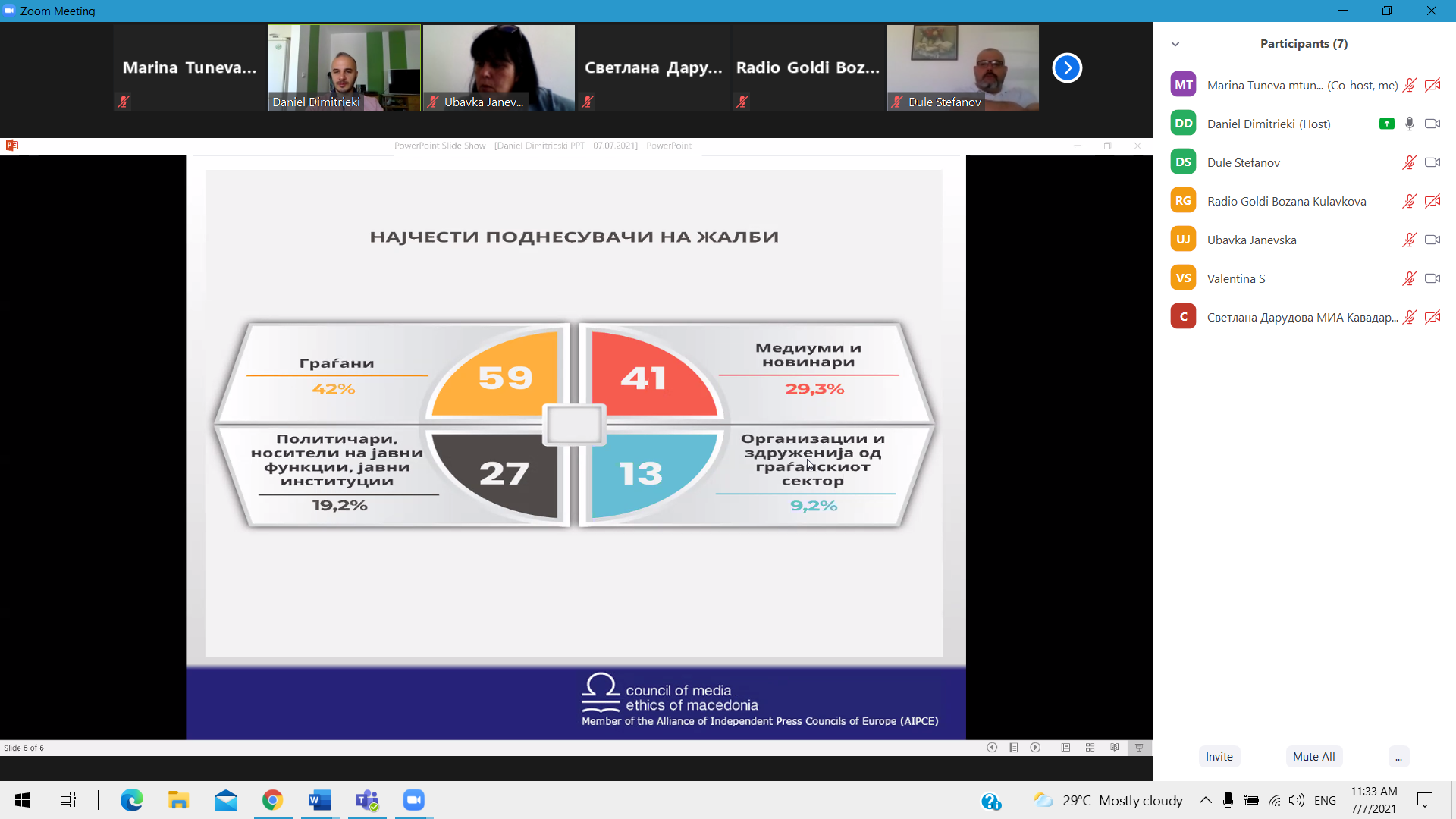Today, July 7th 2021, the Council of Media Ethics held an online meeting with the journalists from the Vardar region. At the meeting, the Executive Director of CMEM, Ms. Marina Tuneva, brought the attendees’ attention to the challenges and states pertaining to media reporting in COVID-19 circumstances. Additionally, Ms. Tuneva elaborated on the activities that CMEM undertook and implemented in the course of the pandemic circumstances.

‘Guidelines for Ethical Reporting in Online Media have been drafted as an addendum to the provisions set out in the Code of Journalists, adopted in 2001, for the purpose of reflecting the specifics of such media. In addition to this, most of the complaints received by CMEM refer specifically to online media. Having in mind that they are numerous, it is somewhat expected, but, nonetheless, there is a signifcant number of infringements in the media sphere. We are all aware how often this topic has been discussed. Hence, we have decided to proceed with new initiatives in this particular sphere. The creation of the Guidelines for Ethical Reporting in Online Media followed the establishment of the Register of Professional Online Media at the end of 2019, and its launching in 2020. We proceeded with drafting of Guidelines for Inclusive Reporting in the Pandemic due to the fact that the civil sector and the citizens themselves reacted due to the insufficient representation of the vulnerable groups with reference to media reporting so that they feel engaged and covered with regular reporting’, stated Ms. Tuneva.
The Executive Director of CMEM briefed the journalists on the activities of CMEM which encompasses acting on complaints about non-professional operation, which is within the primary scope of work of the Press Councils of the countries in Europe. Additionally, CMEM is engaged in a different scope of activities aimed at understanding and promoting its role and mission and encouraging professional media operation. In this context, while the today’s working meeting with the journalists from the Vardar region was ongoing, CMEM on its FB page announced the best journalistic stories pertaining to inclusive reporting in the spirit of its tradition of rewarding professional journalism and good reporting. Moreover, CMEM is engaged in organization of trainings, conducting its own research, upgrading the ethical framework and publishing calls with the goal of establishing self-regulation to the highest possible extent in this specific area.
In the course of today’s meeting, particular emphasis was placed on the occurrence of sensationalistic media products, failure to distinguish journalistic from promotional contents as well as to the issue of insufficient protection of privacy and personal data, which is a kind of common phenomenon not just in our country but also in the other European countries, as detected with the research conducted by CMEM.
The analysis of the operation of the Complaints Commission for 2020, indicated a double increase in the number of complaints received when compared to 2019. Last year, a total of 140 complaints were received at the Commission as opposed to 83 complaints in 2019. It is worth mentioning the increased number of settled complaints by virtue of mediation leading to 13 settled complaints, which marks an increase of 15% out of the total number as opposed to only 4 in 2019. As for last year, 109 complaints referred to detected elements of infringement of the Code of Journalists whereas 18 cases were rejected and no proceedings were instigated.
‘Our expectations as regards the mediation trend is to be either identical or increased in 2020 which implies that both stakeholders, namely, the plaintiff on one side and the concerned media that the complaint is addressed to on the other side more and more communicate and cooperate with the self-regulatory body, and in particular as regards online media and Internet portals. Upon lodging the request for response on our side with cited complaints findings on the part of the plaintiff, the media react more to any such complaints and explain why they have published this text or any other contentious contents’, stated Mr. Daniel Dimitrievski, the Program and Complaints Coordinator of CMEM.
The inclining trend as regards complaints is ongoing this year as well. In the course of the first six months, the Commission received 95 complaints which marks an increase of 20 to 30 percent compared to the same time period last year. In the year 2020, the number of complaints with detected elements of hate speech, discrimination, stigmatization, etc. is 5.5 percent. Additionally, there is reporting of cases that have been published on the Internet portals after being initially published on social media with pronounced elements of hate speech. This is an indicator of the scope of work ahead of us requiring systematic solution and engagement of both citizens and civil society organizations, as well as the necessity of timely reaction on the part of the public institutions that are tasked to respond to such occurrences.

In the course of the discussion with the participation of the journalists from the Vardar region pertaining to reporting in COVID-19 circumstances, communication issues with the local institutions, their partial or full closure, as well as the inability to report directly on the operation of the municipal emergency headquarters were brought to the attention of all attendees. The journalists dwelled on the factual state and underlined the issue of understaffing as regards employed or engaged journalists and thus the inability of timely provision of accurate information due to the unequal treatment by the public health institutions.
Having in mind such unfavorable conditions characterized by disregard on the part of the public health institutions, the journalists were forced to make use of the available official information published by the national health authorities and failed to act timely to certain confusions created by the citizens themselves or by the opposition parties. Furthermore, the journalists raised the issues of adjusting the Code of Journalists to the current societal affairs or drafting a new one due to the fact that it is outdated and adopted in 2001 and to the necessity of using novel reporting formats with reference to the COVID-19 pandemic by following the example of the foreign media that have introduced the practice of more subtle reporting in their respective texts and for the purpose of avoiding any dull and stereotypical reports comprised solely of the numbers of affected, active or diseased citizens which may be intimidating to the citizens.
This event is within the framework of the Project Support to Freedom of Expression in the Media in North Macedonia implemented by the Council of Media Ethics (CMEM) with the support of the EU Delegation to the Republic of North Macedonia.